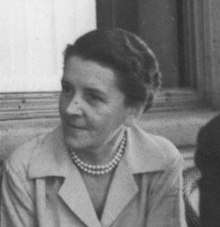Danuta Gierulanka
Danuta Gierulanka (1909–1995) was a Polish mathematics educator, psychologist, philosopher, and translator. She was associated with Roman Ingarden and known for her work in phenomenology and the philosophy of mathematics.[1]

Mathematics educator
Gierulanka was born in Kraków on June 30, 1909; her father was a civil servant. She studied mathematics at the Jagiellonian University from 1927 to 1932, completing a master's degree with a thesis on Periodic solutions of differential equations, and stayed there for another year for a teaching credential. From 1933 to 1938 she worked as a high school teacher of mathematics, science, and philosophy at two Kraków gymnasia.[2]
Psychologist
Gierulanka returned to the Jagiellonian University in 1938, as a psychology student working in the Laboratory of Experimental Psychology with Władysław Heinrich.[1][2] Her studies were interrupted by World War II, during which she and her brother, physicist Jerzy Gierula, taught in secret. She completed her doctorate in 1947.[2] Her dissertation, O przyswajaniu sobie pojęć geometrycznych [On Grasping Geometrical Notions], was published as a book in 1958.[1][2]
Gierulanka remained at the Jagiellonian University, and in 1953 became an adjunct in mathematical analysis at the university, with the plan of writing a habilitation thesis combining mathematical analysis with psychology. However, this did not materialize and in 1957 she returned to the Laboratory of Experimental Psychology.[2]
Philosopher
In 1958 Gierulanka moved again, becoming an adjunct in philosophy.[2] She became interested in Roman Ingarden's work in phenomenology,[1] and wrote a habilitation thesis in 1962 on the phenomenology of mathematics, Zagadnienie swoistoici poznania matematycznego [On the Peculiarity of Mathematical Cognition], also published at the same time as a book.[1][2] Failing to obtain a permanent position in philosophy, she returned to a posting in psychology at Jagiellonian, from which she retired in 1971. She died on April 29, 1995, in Kraków.[2]
After her habilitation work, Gierulanka became one of the editors of Ingarden's collected works. She also translated works of Ingarden, Edmund Husserl, and Edith Stein into Polish.[1][2]
References
- Bielawka, Maria (2002), "In the Shadow of the Master: Danuta Gierulanka, Phenomenology of Mathematics", in Tymieniecka, Anna-Teresa (ed.), Phenomenology World-Wide, Analecta Husserliana, 80, Springer Netherlands, pp. 199–201, doi:10.1007/978-94-007-0473-2_18
- Domoradzki, Stanisław; Stawiska, Małgorzata (2015), "Distinguished graduates in mathematics of Jagiellonian University in the interwar period. Part II: 1928-1939", Technical Transactions (Czasopismo Techniczne), Fundamental Sciences (Nauki Podstawowe), Cracow University of Technology, Series 2-NP, 112: 117–141, arXiv:1511.06005. See Section 2.7, Danuta Gierulanka.
Further reading
- Kusak, Leszek (2002), "Danuta Gierulanka – życie i twórczość" [Danuta Gierulanka – fire and creation], Ruch Filozoficzny, 3 (3): 411–415